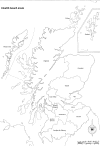Rhegmatogenous retinal detachment in Scotland: research design and methodology
- PMID: 19317907
- PMCID: PMC2666641
- DOI: 10.1186/1471-2415-9-2
Rhegmatogenous retinal detachment in Scotland: research design and methodology
Abstract
Background: Rhegmatogenous retinal detachment (RRD) is a potentially blinding condition and a common cause of ocular morbidity. Establishing an accurate estimate of disease incidence and distribution is an important first step in assessing the healthcare burden related to this condition and in subsequent planning and provision of treatment strategies. The aim of this study is to obtain a first estimate incidence of RRD in Scotland, to estimate the incidence of familial RRD and to describe the known associations of RRD within the study population.
Methods/design: We have established a national prospective observational study seeking to identify and recruit all incident cases of RRD in the Scottish population over a 2 year period. After fully informed consent, all participants will have a blood sample taken and a full medical history and clinical examination performed including visual acuity, refraction, slit-lamp examination, intra-ocular pressure measurement and detailed fundal examination. We describe the study design and protocol.
Conclusion: This study will provide the first estimate of the annual incidence of RRD in Scotland. The findings of this study will be important in estimating the burden of disease and in the planning of future health care policy related to this condition. This study will also establish a genetic resource for a genome wide association study to investigate if certain genetic variants predispose to RRD.
Figures



References
-
- Wilkes SR, Beard CM, Kurland LT, Robertson DM, O'Fallon WM. The incidence of retinal detachment in Rochester, Minnesota, 1970–1978. Am J Ophthalmol. 1982;94:670–673. - PubMed
Publication types
MeSH terms
Grants and funding
LinkOut - more resources
Full Text Sources
Medical

